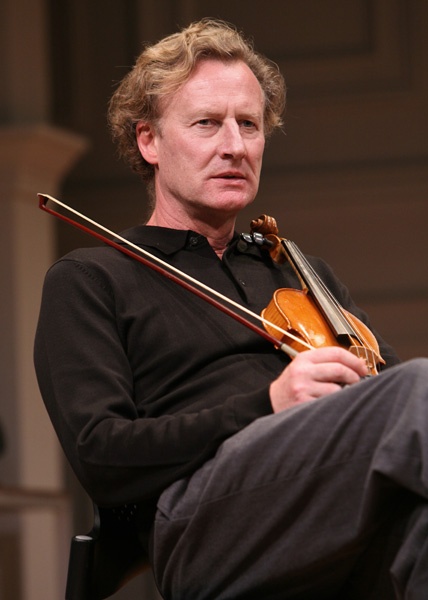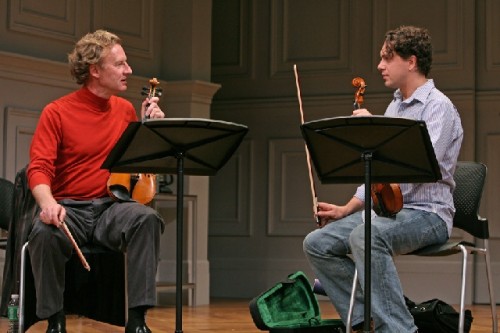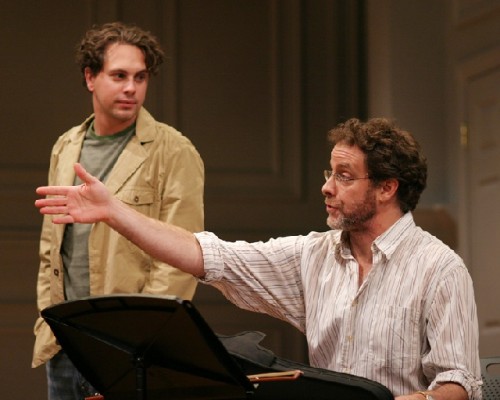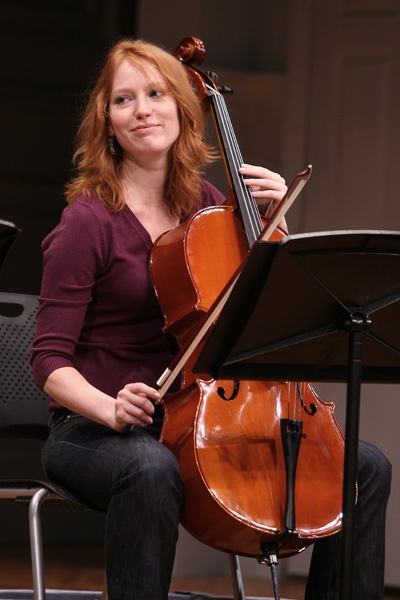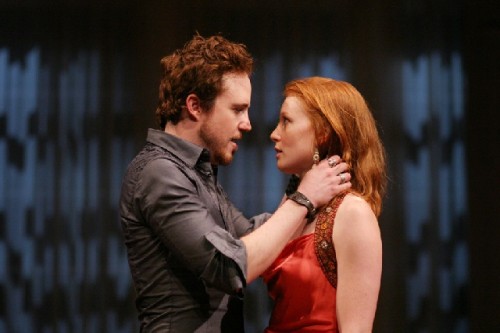Dissonance at Williamstown Theatre Festival
A String Quartet Comes Unstrung
By: Charles Giuliano - Jul 08, 2007
Dissonance
By Damian Lanigan. Directed by Amanda Charlton. Sets, Andrew Layton. Costumes, Jennifer Caprio. Lights, Marcus Doshi. Sound, Bart Fasbender. Production Stage Manager, Robyn Henry. Production Manager, Michael Wade. Casting, Laurel Schutzel, Tara Rubin Casting. Cast: Rufus Collins, Patch Darragh, Daniel Gerroll, Thomas Sadoski, and Alicia Witt. The Williamstown Theatre Festival, June 27 through July 8, 2007.
The Bradley Quartet is in the midst of rehearsal for a rare appearance at Carnegie Hall ending the tour of their tenth season. In darkness we hear a few bars of Mozart's C-Major Quarter, K. 465 which is known as The Dissonance Quartet for the theme of its out of kilter harmony. As the lights come up, a device that is repeated through the rehearsals in this new play by Damian Lanigan presented in the smaller, Nikos Stage of the Willimastown Theatre Festival, it is a means to make it appear that the actors actually are skilled at playing the instruments they hold quite correctly.
Following a mean spirited opening monologue by James (Daniel Gerroll), the elder leader and first violinist of the group, it is immediately apparent that it is the music that has held them together during a decade of his overbearing behavior. This is to be a culminating performance in the career of the group to perform before the audience and critics of the renowned and challenging Carnegie Hall in New York City. As their squabbles evolved during the course of the play we learn that there are many and complex reasons, for and against, why James has kept the group away from the ultra critical New York audience. Paul (Rufus Collins), the much abused brother and violist in the group, has invited the blind, brilliant former teacher of James to attend the concert. It was this mentor who very early on concluded that James did not have what it takes to be a successful soloist.
When this point is raised James cries out against the harshness of such a judgment when he was still a vulnerable child. How cruel. But then he soberly reflects that the master/ teacher was quite correct. He later opines of himself, and the other three musicians, that string quartets are the refuge of frustrated, second tier performers who can't cut it as soloists. And that most of the repertoire, such as the challenging late quartets of Beethoven are the emotional, final utterances and death knells of the composers in question. If James is harsh on the very nature of string quartets and their professional/ psychological foibles, which he knows all too well, the very bottom of the barrel and constant objects of malicious jokes are violists. They simply fill in the range between the leads of the first violinist and the bottom supplied by the cello. A violist, in this cruel analysis, just spends a lifetime of filling in.
There may be terrible truth in this analysis but Paul seems to suffer and deflect all such jibes. Clearly through his low key endurance and patience, although when called upon he knows chapter and verse all the twists and turns including quoting at length from the performances and their reviews, he endures for the love of making music. He will take any insult just to hold the group together to come back and perform yet another season. When things fall apart he prevails with suggestions of music they might revisit or new works to add.
Hal (Thomas Sadoski) the second violin and former student of James, as is cellist Beth (Alicia Witt), has input and suggestions for a change of tempo. To his ear the playing is too slow. James will have none of it although Hal prevails. He has many other suggestions all of which are overruled by James. This is the Bradley Quartet and, as First Violin, I am its leader he argues inflexibly. It is hard to deny that. But Hal argues on the side of what is best for the music and quartet. Again, a compelling argument. He turns to Beth and Paul for their responses to the debate. Both are reluctant to challenge the authority of James but agree with Hal that there be open discussion of their mutual best interest.
To this Hal suggests that they form a plan with a rotating veto in matters under dispute. They will take turns and that individual will have the absolute final say in any artistic conflict. As first violin and leader James requests that he go first and extracts from the others that his decision will be final in the matter at hand. When they so agree he announces that his decision is to reject rotating vetoes.
All of this haggling is cutting into actual rehearsal time. Then Beth requests permission to leave early because she has a lucrative appointment, a thousand dollars per session, with a student arranged through their recording company. It seems that the company underwrites their minimal sales through the revenue generated by rock artists. Their huge record sales offset the costs of prestigious but unprofitable classical recordings. Of course James thinks the whole idea of rock music is beneath contempt.
For her meeting with Jonny, the rock star, a wall raises and a room rolls forward in the clever but sparing set design by Andrew Layton. Jonny (Patch Darragh) has made millions and been declared a genius by the rock media but doesn't know the first thing about music in a formal sense. He has recently left the group and is contemplating a solo career and perhaps using strings for his next sessions. He plays for her a snippet he heard on the radio. She immediately identifies it as Borodin's String Quartet No. 2 and even mentions the specific group and recording. Jonny is floored, and as we learn, smitten. Beth plays a mean cello and is also easy on the eyes. The subject gets around to how playing her instrument, a he, is much like making love. Ah yes, the plot thickens. But other than stroking her cello, a hundred thousand dollar instrument we discover, she hasn't had much of a love life. Music of course is her first and only love although she regrets occasions when she hooked up with Hal.
As the lessons progress we and Jonny learn more about serious music. There are many levels of such education in this work by author Damian Lanigan who clearly has a great love of the music and insights to share. It becomes clear that the scruffy and sexy Jonny can do a lot for her on many levels. It starts with a conversation about instruments like those of Stradivarius and how much they cost. Millions is her answer and the sad fact is that often their owners keep them in back vaults and they aren't even played. Jonny states that he owns a super expensive instrument: A Fender Stratocaster used by Jimi Hendrix at Woodstock. And, do you play it, Beth asks? No is the answer because it is now in too many pieces. Hendrix smashed it.
During a later meeting he has set up a cello on a stand. She is stunned and asks where he got it. The instrument is a priceless Guarneri from the 18th century. Beth is floored but rejects the gift which would make her feel cheap and obligated for sexual favors. It is just too extravagant and she doesn't deserve it. He is just trying to seduce her. Jonny's response is that it's just money and he has enough left over to buy an island in the Caribbean. That his feelings for her are deep and genuine. She is not just another groupie. He wants her to play for him but she responds that she didn't bring a bow. But Jonny had anticipated that but was surprised that it cost $85,000. Eventually they embrace and, well, you may guess what happens after that.
The theme of self taught rock stars wanting to use classical musicians in their recordings is really nothing new. It goes back further than the Beatles and rock to jazz artists like Billie Holiday and Charlie Parker "With Strings." But when Jonny attends the final rehearsal of the group, as it all falls apart, James won't consider it. Even though it would bring a huge audience and much needed revenue to the struggling quartet. James would never cheapen himself and the music in such a vulgar manner.
Actually, James set in motion the self destruction of the group. It is his final insult and violation. As the fission accelerates they turn on each other (with the exception of the ever neutral Paul). James has agreed to let Hal play lead in the Borodin seemingly accepting suggestions for a different interpretation. But then harshly concludes, just as he predicted, that Hal's lead and suggestions are absolute crap. That Hal is a hack and always will be nothing better than second string. He rightly predicts that Hal will teach violin in Prague and lecture on the history of the piccolo. James also calls it right in suggesting that Beth and Jonny make beautiful music together. Beth passionately rebuts Hal's warning not to sell out to Jonny. Her response is to spell out that she has never loved Hal and regrets their misdirected moments of intimacy. Beth's emotional outburst and honesty violates a fundamental rule to keep their personal life and feelings out of professional relationships.
While the decade of love hate music making has come to an end there is that one final Carnegie Hall performance. They are seen standing before the audience and taking bows one last time. Furtively, and with no last embrace, they go their separate ways. James, alone, lingering on stage, at this final curtain call, slowly turns and walks toward us as the light fades. It was a stunning and appropriate end.
On many levels this complex and well crafted new play deserves future productions. It is richly informative of the passion and challenges of making serious music as well as how it encroaches on, but is kept separate from, the private lives of the performers. On all levels of music making there are countless stories of individuals who despise each other but stay together for the sake of the music. Arguably music making is the only true love that really matters. Until it is no longer possible.

